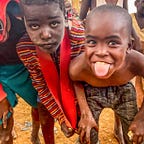COVID-safe prisons and communities
Funding from the Government of Japan allowed UNDP to deliver PPE and other supplies to prisons and to advocate for the release of low-risk prisoners
When COVID struck Somalia in March 2020, some of the most vulnerable people were literally unable to avoid it: the country’s prisoner population.
“The worst part of my time in prison was when Corona started,” remembers Ali Shire Mohamed, who was in prison in Gardo, Puntland when the pandemic began. “We asked ourselves, what if infected people are arrested and then brought to jail? Would we all die here, one after another?”
Ali wasn’t the only person asking. At UNDP and in the local ministries of justice. people were also thinking about the same things: how to make prisons safer and how to reduce the number of people at risk.
There were two immediate problems: prisons lacked hygiene supplies — particularly PPE, water and soap — and they were overcrowded, with no way to socially distance, poor ventilation and sometimes many prisoners stuck inside cells designed for far fewer people.
With funding from the government of Japan, UNDP provided masks, hand sanitiser, water tanks, soap and gloves to prisons in Gardo, Bosaso and Galkaiyo, helping to keep staff and prisoners safe and making it possible to wash hands and commonly shared facilities and equipment.
“We took strict precautions,” explains Gardo prison warden, Said Barre. “We started installing tanks and also took care of our hygiene.”
At the same time, UNDP worked with the the relevant ministries of justice to identify low-risk prisoners who could be released, including pregnant women, old people and those who were nearing the end of their sentences. The teams also helped to flag prisoners who had served their sentences but who had not yet been released due to administrative oversights in Somalia’s under-resourced prison system. More than 1,0000 prisoners were released early.
“The day I was released — the day I got my freedom back — I could hardly contain myself, I was so happy,” says Ali.
Reducing overcrowding and improving sanitation in prisons also meant that people living nearby were safer: with COVID-19 less able to spread inside the prisons, it had less chance to escape via visitors and prison staff into local communities.
Ali is now back with his family and working on a construction site. “I am not an educated man,” he says, “so the work I get is not easy. But after I returned home, back to my family, I cam to realise how different life was there [inside the prison], and that the problems I have now pale in comparison.”
In total, UNDP and the government of Japan provided supplies for three prisons and contributed to the release of more than 1,000 low-risk prisoners.
The work is part of a US$1.2 million grant from the Japanese Government to help address the socio-economic fallout from the COVID-19 pandemic. This includes delivering masks, soap and other supplies, training local youth and vulnerable groups for new work opportunities, providing cash grants to help internally displaced people set up new businesses and raising awareness of how to prevent the spread of the virus.
For an overview of our Japanese-funded work see: https://undpsom.medium.com/government-of-japan-helps-somalia-fight-covid-ed0d0b1c2564
For other ways UNDP is helping to support the rule of law: https://www.so.undp.org/content/somalia/en/home/democratic-governance-and-peacebuilding/rule-of-law.html
